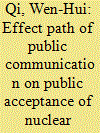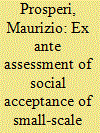| Srl | Item |
| 1 |
ID:
176878


|
|
|
|
|
| Summary/Abstract |
Nuclear power plants in operation usually take public communication measures to increase the public acceptance of nuclear energy. This study explores how public communication affects public acceptance. The data were obtained through questionnaire surveys (N = 364) of residents living around the Qinshan, Tianwan, and Hongyanhe nuclear power plants in China. Based on the researches of mass communication effect path, a structural equation model showed that public communication cannot affect public acceptance directly, but can indirectly affect public acceptance through three paths. In the first path, public communication positively affects trust, trust positively affects perceived benefit, and perceived benefit positively affects public acceptance. In the second path, public communication positively affects trust, trust negatively affects perceived risk, and perceived risk negatively affects public acceptance. In the third path, public communication positively affects perceived benefit, and perceived benefit positively affects public acceptance. Furthermore, public communication has a positive effect on knowledge, but has no effect on public risk. This study also showed that knowledge cannot affect perceived risk and perceived benefit. We proposed policy suggestions based on the results.
|
|
|
|
|
|
|
|
|
|
|
|
|
|
|
|
| 2 |
ID:
162909


|
|
|
|
|
| Summary/Abstract |
Social acceptance is a relevant determinant of the development of agro-energy systems because its absence can cause delays or even the abandonment of innovative projects. This paper aims at an ex ante assessment of the socio-political acceptance of small-scale agro-energy systems in rural areas located in southern Italy, according to the bioenergy village approach. Starting from a theoretical model, we investigated the key factors influencing the perception of the risks and benefits of the realization of a biomass combustion plant, by a statistical survey on a sample of 152 members of the local community living in eight municipalities located in a rural area. Through exploratory and confirmatory statistical analyses, we identified two key factors: (a) the economic, environmental, and social benefits for the community and (b) reassurance from the energy company management. This research shows that it is very important to consider these elements in order to facilitate dialogue and the debate within the local community. In this way, the involved actors will be enabled to express their expectations to decision makers and policymakers, thus contributing to the steering of the project. In other words, community involvement and the democracy of the energy policy processes are favoured.
|
|
|
|
|
|
|
|
|
|
|
|
|
|
|
|
| 3 |
ID:
125727


|
|
|
|
|
| Publication |
2013.
|
| Summary/Abstract |
The rapid spread of biogas production in Germany has resulted in an increased public debate over this new business branch. Today the production of biogas is much more controversially debated than several years ago. At the same time it could be proven that even among farmers themselves the acceptance of biogas production in some regions is somewhat dampened due to accompanying "collateral damages". Therefore, the goal of this paper is to identify relevant influencing factors that determine the acceptance of the innovation "biogas" among farmers by applying a causal analysis. Initial results among the five investigated determinants show that not only an individual attitude toward biogas but also the farmers' personal innovativeness strongly and significantly influences an individual's acceptance of the innovation "biogas".
|
|
|
|
|
|
|
|
|
|
|
|
|
|
|
|